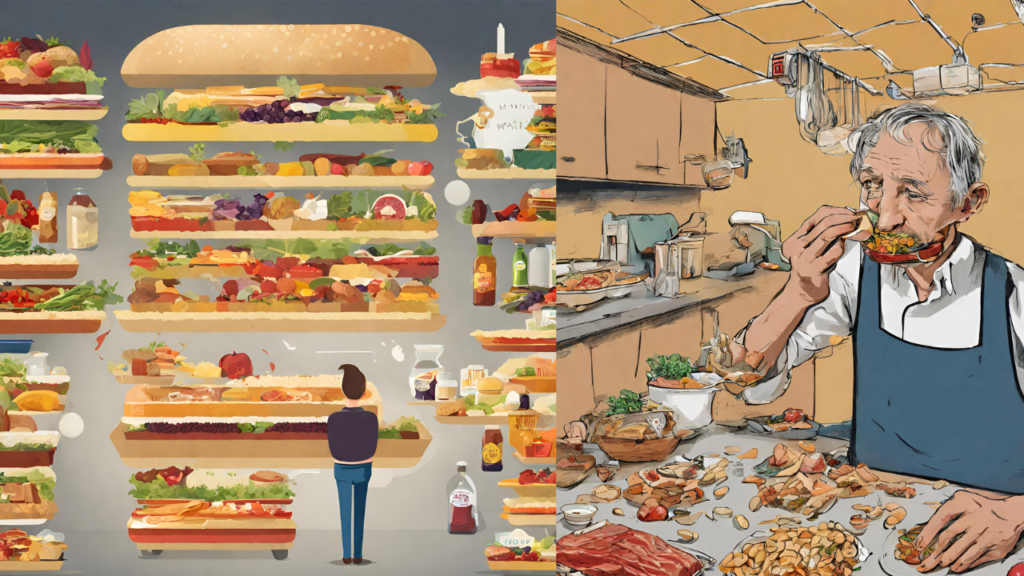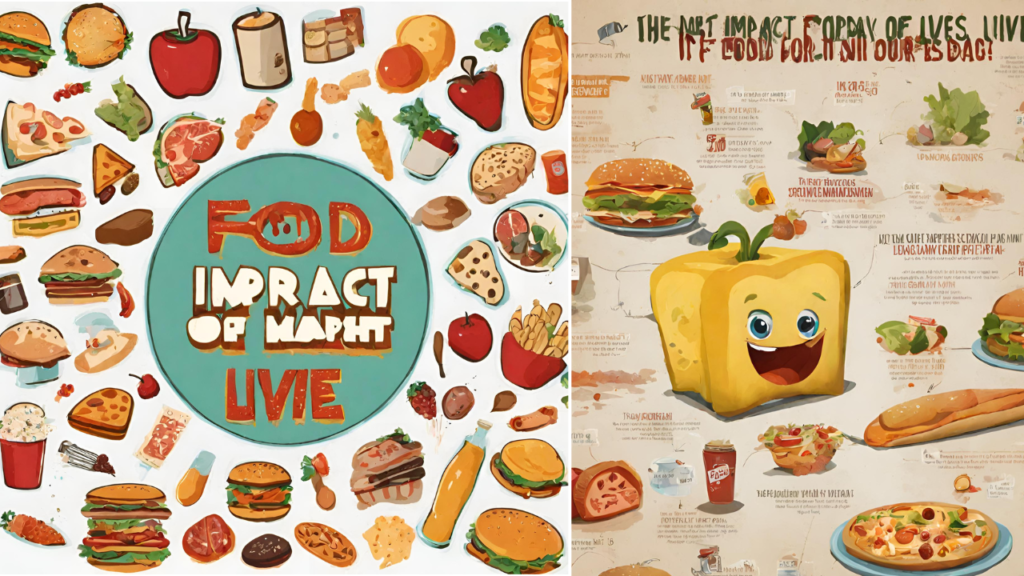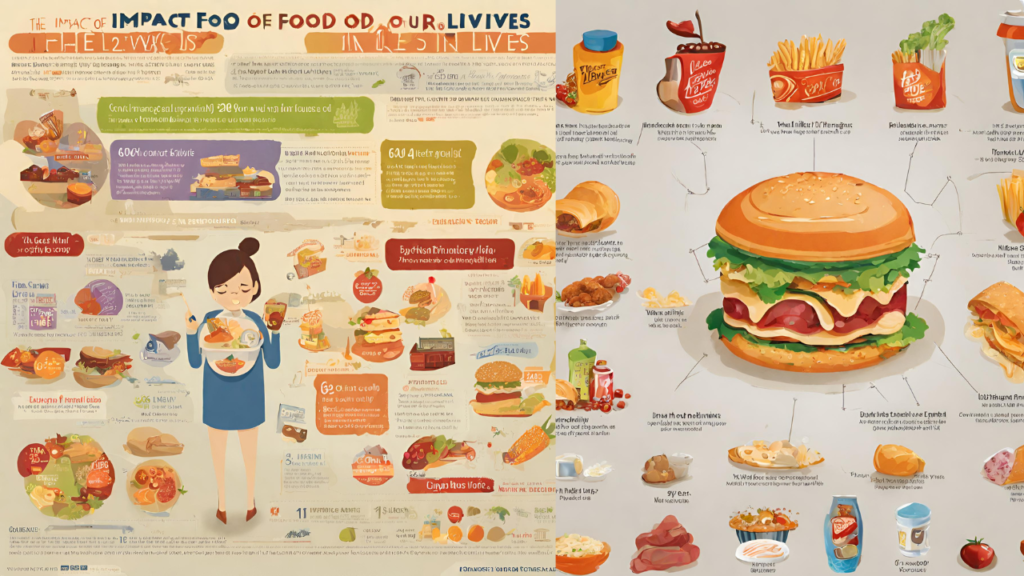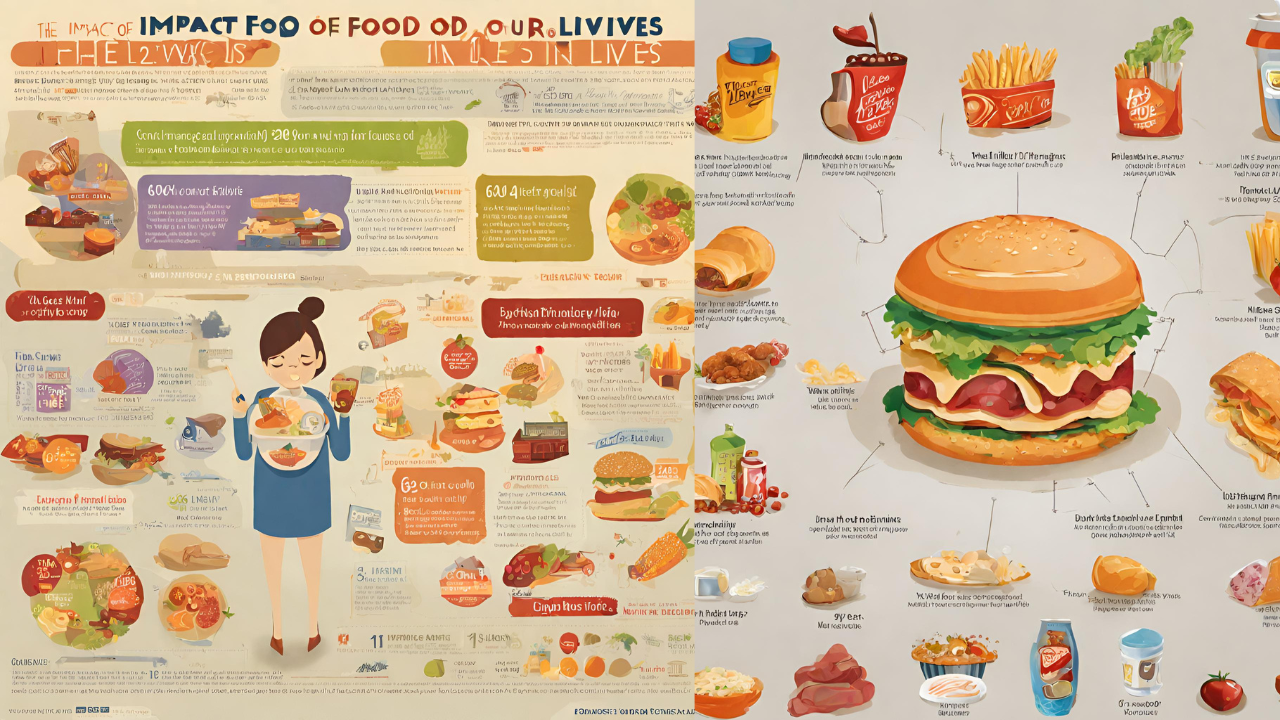SEO Meta Description
Discover how the impact of food on our lives extends beyond mere sustenance. Explore its effects on health, culture, society, and more in this comprehensive article.
Introduction
Food, far beyond being a necessity, shapes our lives in multifaceted ways. From its influence on our health to its role in cultural traditions and social interactions, the impact of food on our lives cannot be overstated. Let’s delve deeper into how food transcends its basic function of nourishment to become intertwined with every aspect of our existence.
Table of Contents
Importance of Food
Food is not just fuel for our bodies; it’s the foundation of our well-being. Its significance extends to our physical and mental health, affecting our energy levels, mood, and overall vitality.

Food and Health
Physical Health Impact
The quality of food we consume directly impacts our physical health. Nutrient-rich foods contribute to optimal bodily functions, while poor dietary choices can lead to various health issues such as obesity, diabetes, and heart disease.
Mental Health Connection
Beyond its physical implications, food also plays a crucial role in mental health. Certain nutrients influence neurotransmitter production, affecting mood regulation and cognitive function. Therefore, maintaining a balanced diet is essential for overall well-being.
Nutritional Value
Essential Nutrients
A diet rich in essential nutrients—such as vitamins, minerals, proteins, and carbohydrates—is vital for supporting bodily functions and preventing deficiencies. Incorporating a variety of foods ensures we meet our nutritional needs adequately.
Balanced Diet Importance
Balancing macronutrients and micronutrients is key to achieving optimal health. A balanced diet comprising fruits, vegetables, whole grains, lean proteins, and healthy fats provides the necessary nutrients for sustained vitality.
Cultural Significance
Food as a Cultural Identity
Food serves as a cornerstone of cultural identity, reflecting traditions, beliefs, and values passed down through generations. It encapsulates the essence of a community’s heritage and provides a tangible link to ancestral roots.
Traditions and Customs
Many cultural rituals revolve around food, from celebratory feasts to mourning ceremonies. These culinary traditions not only nourish the body but also foster a sense of belonging and continuity within communities.
Social Aspect
Food and Social Gatherings
Sharing meals fosters social connections and strengthens relationships. Whether dining with family or gathering with friends, food serves as a focal point for bonding and camaraderie.
Community Bonding through Food
Communities often unite over shared culinary experiences, organizing potlucks, food festivals, and communal meals. These gatherings promote inclusivity and solidarity, reinforcing social ties.

Emotional Connection
Comfort Foods
Certain foods evoke nostalgic memories and offer emotional comfort during times of stress or sadness. These “comfort foods” provide solace and reassurance, transcending their nutritional value to soothe the soul.
Food Memories
Memories associated with food hold profound significance, evoking emotions tied to past experiences. Whether recalling a cherished family recipe or reminiscing about a memorable meal, food memories shape our emotional landscape.
Economic Influence
Food Industry Impact
The food industry exerts a significant influence on economies worldwide, driving agricultural production, food processing, and distribution. It creates employment opportunities and contributes to economic growth and stability.
Access to Healthy Food
However, disparities in access to healthy food persist, particularly in marginalized communities. Addressing food insecurity and promoting equitable food access are crucial steps toward building healthier societies.
Environmental Impact
Sustainable Food Practices
Our food choices also have environmental repercussions, affecting ecosystems and natural resources. Embracing sustainable farming methods, reducing food waste, and supporting local producers are pivotal for mitigating environmental degradation.
Food Waste Reduction
Food waste poses a considerable environmental challenge, contributing to greenhouse gas emissions and resource depletion. Adopting strategies to minimize food waste at the consumer and industrial levels is imperative for fostering environmental stewardship.
Conclusion
In conclusion, the impact of food on our lives encompasses a spectrum of dimensions, from health and culture to society and the environment. Recognizing the interconnectedness of these factors underscores the importance of making informed food choices that promote personal well-being and sustainability.
FAQs
How does food affect mental health?
Consuming nutrient-rich foods supports brain function and mood regulation, whereas poor dietary choices can contribute to mental health issues like depression and anxiety.
What role does food play in cultural traditions?
Food serves as a focal point of cultural rituals and celebrations, reflecting heritage, customs, and identity within communities.
How can individuals reduce food waste at home?
Practicing mindful consumption, meal planning, and proper storage techniques can help minimize food waste and promote sustainability.
Why is access to healthy food important?
Access to nutritious food is essential for maintaining optimal health and well-being, yet many communities face barriers to accessing fresh, wholesome options.
What are some examples of sustainable food practices?
Sustainable food practices include organic farming, supporting local food systems, reducing food miles, and minimizing packaging waste.
How does food contribute to social bonding?
Sharing meals fosters social connections and strengthens relationships, providing opportunities for bonding and camaraderie.

Food and Social Bonding
Food serves as a powerful catalyst for social bonding, bringing people together in shared experiences and fostering connections that transcend cultural and social boundaries.
Sharing Meals
One of the most fundamental ways food contributes to social bonding is through the act of sharing meals. Whether it’s a family dinner, a gathering of friends, or a community celebration, sharing food creates a sense of togetherness and camaraderie. Sitting down to eat together provides an opportunity for conversation, laughter, and the exchange of stories, strengthening bonds and deepening relationships.
Cultural Traditions
Across cultures, food plays a central role in traditional rituals and celebrations, further enhancing social cohesion. From holiday feasts to wedding banquets, food serves as a symbol of abundance, hospitality, and generosity. These shared culinary experiences reinforce cultural identity and provide a sense of belonging within a community.
Creating Memories
Food-related experiences often form lasting memories that bind individuals together. Whether it’s reminiscing about a favorite childhood dish or discovering a new cuisine together, food has the power to evoke nostalgia and forge connections between people. These shared memories become a source of bonding and solidarity, strengthening interpersonal relationships over time.
Building Relationships
Food-related activities, such as cooking together or dining out, offer opportunities for bonding and intimacy. Collaborating in the kitchen encourages teamwork and communication, while sharing a meal allows for the expression of care and affection. These shared experiences deepen bonds between individuals and contribute to the formation of meaningful relationships.
In conclusion, food plays a multifaceted role in social bonding, facilitating connections and fostering a sense of belonging within communities. By sharing meals, honoring cultural traditions, creating memories, and building relationships through food, we cultivate strong social ties that enrich our lives and contribute to our overall well-being.
